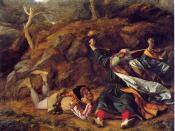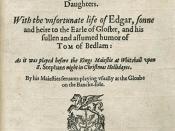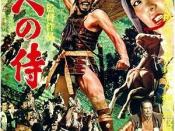The plays of William Shakespeare have long been an inspiration for filmmakers from the very beginnings of the art of film, to modern adaptations such as 10 Things I Hate About You and Scotland, PA. In this case, though the events, scenes, philosophies and characters are rearranged and re-coded, other literary elements and influences circulate throughout, and the director definitely ingrains the film with his own ethos, Akira Kurosawa's Ran is the ultimate in Shakespeare adaptation to film.
The tragedy King Lear, however, is only one of several influencing elements on the film and Ran is by no means to be considered a retelling of the play. In fact, the original inspiration for the film came through Kurosawa's notion to invert the legend of Motonari Mori, whose three sons are admired in Japan as the ideal of family loyalty (Goodwin 196). Later he recognized the similarities between the story he was crafting and the play and basically, to use a horrible pun, 'ran' with it.
Kurosawa said himself of King Lear; "I had no wish for a literal transposition. I looked mainly for perspective" (Grilli).
Ran is certainly not the first to adapt King Lear to the big screen. Along with the Olivier film viewed in class, the bar was set with Peter Brook's "bleak existential tale of meaningless violence in a cold, empty universe" and Grigori Kozintsev's interpretation, described as "a Christian-Marxist story of redemption and renewal" (Jorgens 236-37). All of these follow the Shakespeare original much more closely than does Ran, though they are still able to focus on different elements within the play and be entirely different in tone and style.
By the time Akira Kurosawa made his attempt, he had already been in the film industry for decades and had seen his share of ups and...


